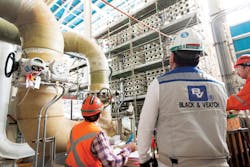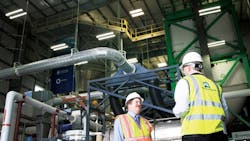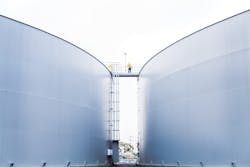About the author: David Mayers is senior managing director for Black & Veatch management consulting. Mayers can be reached at [email protected].
Water utilities are not only worried about their aging infrastructure; their aging workforce is increasingly becoming a top challenge. In the latest W&WD State of the Industry Report, 39% of respondents were at least 60 years old, signaling that a significant portion of the water industry workforce will retire in the next decade, potentially depleting the industry of experienced professionals.
Utilities need to prepare for this coming exodus. After all, when the people who know water operations best depart, they could leave significant gaps in knowledge, putting water systems and sustainability at risk. In addition to preserving knowledge about current operations, tomorrow’s workforce also should prepare for the challenges of an evolving industry.
Addressing the water industry’s aging infrastructure will require facing concerns about an aging workforce.
Changing Water Utility Landscape
Water utilities long have been charged with delivering safe, sustainable drinking water and processing wastewater and storm water to serve their communities. However, operational management is dramatically changing, with advancing technologies and processes such as remote monitoring and automated control increasingly replacing manual monitoring and operations. According to Black & Veatch’s 2017 Strategic Directions: Water Industry Report, the sector rapidly is becoming more data-driven—capturing metrics from more assets and facilities to contain costs, prevent waste and make smart decisions.
Thirty-nine percent of survey respondents said data figured into their processes, but not operationally, while another 20% said data analytics were not part of their current processes but figured into strategic planning. However, methods for capturing and disseminating data consistently among operational staff are still fairly nascent. Half of utilities indicated they currently have or are planning to implement a web-based maintenance management software system that is more widely accessible to field operators.
To adapt to and excel in this new business landscape, water utilities need to focus on maintaining the critical knowledge of departing employees for current operations while looking ahead to the skill sets that the next-generation workforce will require.
Smart Water Skill Set
Deciphering the smart data from automated meter reading and advanced metering infrastructure (AMI) will be foundational for the next generation of water utility management. Forty-four percent of report respondents are planning to implement AMI, with 41% already utilizing this technology, which can be used in virtually all business and operational functions.
To reap the benefits of AMI and similar technological investments, organizations will need to cultivate a workplace culture based on data analytics applications. Knowledge transfer and mentoring programs should include training on ongoing monitoring of data-based processes and associated outputs. Data-based, hands-on training sessions can ensure that best practices and processes also are captured for future utilization. Field staff will be integral to foster the return of accurate data, and management should obtain their buy-in to establish a solid knowledge base.
This data revolution will play a critical role in extending the life of existing infrastructure and managing operational costs—consistently ranked among the most critical industry challenges. Rather than reacting when equipment fails, the focus will be on predictive maintenance, assessing early warning indicators to detect problems in their early stages and take remedial action that is much less costly and disruptive. It is all about working smarter and more efficiently—and doing more with less.
These applications will increasingly drive day-to-day operations, including measuring asset performance and maintenance needs, as well as long-term planning and investment strategies. As water utilities strive to leverage the intelligence in their data, professionals will be expected to understand and use these new tools.
The revolution of data analysis for wastewater treatment has started to change the way the next generation of operators works, learns and trains.
Recruiting the Next Generation
Attracting the qualified talent who will take utilities into the next generation will require innovative approaches. Typically utilities look for candidates with strong backgrounds in core disciplines such as biology, civil engineering and finance, but they will want that foundation complemented by expertise in areas such as information technology and cybersecurity. So how can water utilities brand themselves to appeal to their ideal applicants?
Similar to emerging trends on customer engagement, communication on sustainability initiatives could help change how job seekers perceive the water industry. For example, nearly two-thirds of utilities indicated that they are stepping up efforts to educate people on what the “price of water” covers using a variety of channels, such as social media. Successful water providers engage with consumers online, where younger prospective workers increasingly are accessing information, by presenting the myriad issues facing their industry and details on the solutions they are putting forth to address these challenges. They tell the story about delivering a necessary good through an aging infrastructure despite declining federal and state grants and subsidies. By communicating their story and the true value of water, they also can raise awareness for the core services water utilities offer the community.
These initiatives could extend to promoting the water industry on college campuses, at hiring events and on utility websites. It is easy enough to convey the importance of delivering safe drinking water to the greater public. Communicating the innovative ways water utilities are pursuing sustainability through technology, conservation and resource planning could paint a more alluring picture of the integral role water utility professionals play in supporting local economies.
Aging Infrastructure & Aging Workforce Solutions
Addressing the water industry’s aging infrastructure will require facing concerns about an aging workforce. Fortunately, many water utility leaders invest in software tools that can automate processes and enable optimized asset maintenance. Proper training and buy-in from field staff can ensure that utilities are capturing current best practices from more seasoned professionals and preserving knowledge within their organizations for their future leaders.
Additionally, water providers can align recruiting efforts with ongoing consumer education campaigns to enhance the public perception of water services. These efforts can be expanded and integrated with hiring activities to target and attract a younger demographic that values sustainability and can lead water utilities into the future.


